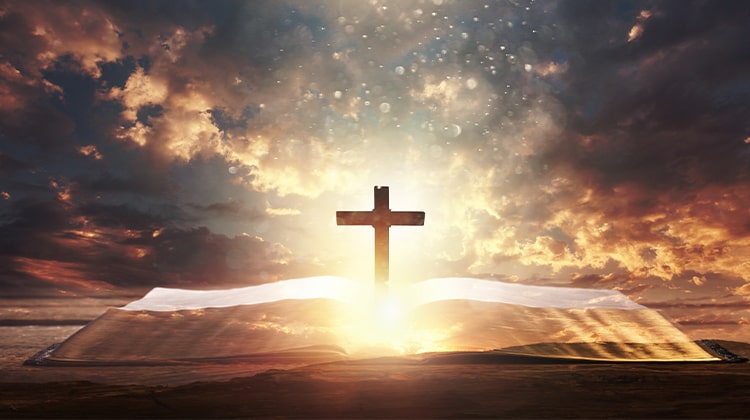Even Jesus’ closest friends didn’t get it. Why didn’t He overthrow the Romans and establish His Kingdom? Why was He rejected? Why did He have to die? So many details of His life did not make sense except for one thing: prophecy.
Prophecies Fulfilled by the First Coming
• The Virgin Birth Prophecy
• The Davidic Prophecy
• The Bethlehem Prophecy
• The Forerunner Prophecy
• The Deliverance Prophecy
• The Gentile Prophecy
• The Betrayal Prophecy
• The Triumphal Entry Prophecy
• The Faithful Servant Prophecy
• The Suffering Servant Prophecy
• The Crucifixion Prophecy
• The Rejection Prophecy
Prophecies Pointing to Christ's Second Coming
• The Lapsed-Time Prophecy
• The Dominion Prophecy
• The Righteous Government Prophecy
Living in the Light of Prophecy
The disciples had lived with Him, studied the Scriptures with Him, watched Him perform miracles, and witnessed His crucifixion, but they still couldn’t put the pieces together. When Jesus appeared to them after His resurrection, He “opened their understanding, that they might comprehend the Scriptures” (Luke 24:45). And He explained, “These are the words which I spoke to you while I was still with you, that all things must be fulfilled which were written in the Law of Moses and the Prophets and the Psalms concerning Me” (Luke 24:44).
Though the Hebrew Scriptures contained more than three hundred specific prophecies about the promised Messiah, Jesus was not what anyone expected. The Jews wanted Him to overthrow the Romans and establish His Kingdom by force. They didn’t want a King in a manger, a Deity in a body, or a Messiah in a cloak of humility. In almost every way, He defied popular assumptions about the long-awaited Savior.
Let’s walk through the events of Jesus’ life that were predicted in the pages of prophecy. We will discover detailed predictions fulfilled by His first coming. Then we will take a quick look at prophecies regarding His Second Coming and what they mean for us today.
Prophecies Fulfilled by the First Coming
The Virgin Birth Prophecy
“The Lord Himself will give you a sign: Behold, the virgin shall conceive and bear a Son, and shall call His name Immanuel” (Isaiah 7:14).
According to the historical record of Isaiah’s book, God fulfilled this prophecy on two levels. First, He provided a sign to ancient Israel’s King Ahaz through the birth of a boy to a prophetess (Isaiah 8:1-8). Hundreds of years later, the prophecy reached its ultimate fulfillment when a young virgin named Mary gave birth to Immanuel—God with us.
The Davidic Prophecy
“The scepter shall not depart from Judah, nor a lawgiver from between his feet, until Shiloh comes; and to Him shall be the obedience of the people” (Genesis 49:10).
This verse predicted that Judah would rule Israel until David's line reached its culmination in the Messiah—a kingdom that will continue for all eternity through Christ Jesus our Lord.
The OT prophets were event oriented, not time oriented. As Peter says, they looked into the future, “searching what, or what manner of time, the Spirit of Christ who was in them was indicating when He testified beforehand the sufferings of Christ and the glories that would follow” (1 Pet. 1:11). This does not make their words any less true; God simply did not reveal the specifics of their prophecies to them.
The prophets saw the sufferings of Christ and the glory all in one picture and could not figure out the time. We in the church age have a better perspective of the timing. With the NT, we recognize there is a period of time between Christ’s first and second comings, and we look forward to His second coming.
The Bethlehem Prophecy
“But you, Bethlehem Ephrathah, though you are little among the thousands of Judah, yet out of you shall come forth to Me the One to be Ruler in Israel, whose goings forth are from old, from everlasting” (Micah 5:2).
Micah’s prediction was both specific and startling. He said the King would be born in the village of Bethlehem and that He would come from the distant past. This provided an additional connection between Jesus and David (Luke 2:4, 11). Like David of old, the coming Messiah would protect Israel from her enemies (Matthew 2:6). When Christ returns, He will reign from Israel, and His rule will extend to the ends of the earth (Luke 1:68-75).
The Forerunner Prophecy
“‘Behold, I send My messenger, and he will prepare the way before Me. And the Lord, whom you seek, will suddenly come to His temple, even the Messenger of the covenant, in whom you delight. Behold, He is coming,’ says the Lord of hosts” (Malachi 3:1). And Isaiah prophesied, “The voice of one crying in the wilderness: ‘Prepare the way of the Lord; make straight in the desert a highway for our God”’ (Isaiah 40:3).
Isaiah wrote words of promise to Israel when the people were in exile. He offered them the hope of deliverance—if only they would repent. By the time Jesus began His ministry, they still had not embraced Isaiah’s message, so God raised up John the Baptist to call the people to repentance (Matthew 11:10). This fulfilled the prophecy and established a foundation for a renewed covenant.
The Deliverance Prophecy
“The Spirit of the Lord God is upon Me, because the Lord has anointed Me to preach good tidings to the poor; He has sent Me to heal the brokenhearted, to proclaim liberty to the captives, and the opening of the prison to those who are bound; to proclaim the acceptable year of the Lord” (Isaiah 61:1-2).
While in Nazareth, Jesus read this prophecy aloud at the synagogue and stated, “Today this Scripture is fulfilled in your hearing” (Luke 4:21). The religious leaders were incensed. They claimed to love God’s law while ignoring the poor, oppressed, and needy in their midst. Jesus exposed their hypocrisy by serving the marginalized and inviting them into His Kingdom.

The Gentile Prophecy
“Indeed He says, ‘It is too small a thing that You should be My Servant to raise up the tribes of Jacob, and to restore the preserved ones of Israel; I will also give You as a light to the Gentiles, that You should be My salvation to the ends of the earth’” (Isaiah 49:6).
God had appointed Israel to be a light to all the world, but they fell away from Him. Here we see Jesus commissioned to restore Israel, bringing salvation to all the nations.
The Betrayal Prophecy
“Then I said to them, ‘If it is agreeable to you, give me my wages; and if not, refrain.’ So they weighed out for my wages thirty pieces of silver. And the Lord said to me, ‘Throw it to the potter’—that princely price they set on me. So I took the thirty pieces of silver and threw them into the house of the Lord for the potter” (Zechariah 11:12-13).

In the first century, thirty pieces of silver equated to the going rate for a slave, and it is the sum Judas received for betraying Jesus (Matthew 27:6-10). After Judas returned the money to the temple, the chief priests and elders used it to purchase “the potter’s field” (verse 7) as a burial ground for strangers.
The Triumphal Entry Prophecy
“Rejoice greatly, O daughter of Zion! Shout, O daughter of Jerusalem! Behold, your King is coming to you; He is just and having salvation, lowly and riding on a donkey, a colt, the foal of a donkey. I will cut off the chariot from Ephraim and the horse from Jerusalem; the battle bow shall be cut off. He shall speak peace to the nations; His dominion shall be ‘from sea to sea, and from the River to the ends of the earth’” (Zechariah 9:9-10).
Although it was not uncommon for royalty to ride donkeys in the ancient Near East, a conquering king would be more likely to choose a warhorse or chariot. Not only did Jesus’ choice of a donkey fulfill prophecy, but it also underscored His mission of peace.

The Faithful Servant Prophecy
“I gave My back to those who struck Me, and My cheeks to those who plucked out the beard; I did not hide My face from shame and spitting. For the Lord God will help Me; therefore I will not be disgraced; therefore I have set My face like a flint, and I know that I will not be ashamed” (Isaiah 50:6-7).
This passage accurately foreshadowed Jesus’ compliance with His arrest and trial, and it also offers insight into His unwavering resolve to carry out God’s will. In the Sermon on the Mount, Jesus made His intentions clear: “Do not think that I came to destroy the Law or the Prophets. I did not come to destroy but to fulfill. For assuredly, I say to you, till heaven and earth pass away, one jot or one tittle will by no means pass from the law till all is fulfilled” (Matthew 5:17-18).
You Might Also Enjoy:
• Meet the Jesus You May Not Know
• Why Was Jesus Born in Bethlehem?
• Why Do We Celebrate Christmas on December 25?
• A Red-Letter Christmas Advent Devotional
The Suffering Servant Prophecy
“He is despised and rejected by men, a Man of sorrows and acquainted with grief. And we hid, as it were, our faces from Him; He was despised, and we did not esteem Him. Surely He has borne our griefs and carried our sorrows; yet we esteemed Him stricken, smitten by God, and afflicted. But He was wounded for our transgressions, He was bruised for our iniquities; the chastisement for our peace was upon Him, and by His stripes we are healed. All we like sheep have gone astray; we have turned, every one, to his own way; and the Lord has laid on Him the iniquity of us all. He was oppressed and He was afflicted, yet He opened not His mouth; He was led as a lamb to the slaughter, and as a sheep before its shearers is silent, so He opened not His mouth. He was taken from prison and from judgment, and who will declare His generation? For He was cut off from the land of the living; for the transgressions of My people He was stricken. And they made His grave with the wicked—but with the rich at His death, because He had done no violence, nor was any deceit in His mouth. Yet it pleased the Lord to bruise Him; He has put Him to grief. When You make His soul an offering for sin, He shall see His seed, He shall prolong His days, and the pleasure of the Lord shall prosper in His hand. He shall see the labor of His soul, and be satisfied. By His knowledge My righteous Servant shall justify many, for He shall bear their iniquities. Therefore I will divide Him a portion with the great, and He shall divide the spoil with the strong, because He poured out His soul unto death, and He was numbered with the transgressors, and He bore the sin of many, and made intercession for the transgressors” (Isaiah 53:3-12).

Isaiah 52:13–53:12, known as the fourth Servant Song of Isaiah, provides an extensive description of Christ’s suffering. Of chapter 53’s twelve verses, all but one reappears in some form in the New Testament. Matthew 26:63 tells us that “Jesus kept silent” at His trial before the high priest, fulfilling the prophetic requirements of verse 7: “Yet He opened not His mouth.” In verse 10, Isaiah predicted that the Messiah would become a sin offering for all who would believe in Him. Even though God’s people had abandoned Him, the Suffering Servant would prove that God had never turned His back on them.
The Crucifixion Prophecy
“They gape at Me with their mouths, like a raging and roaring lion. I am poured out like water, and all My bones are out of joint; My heart is like wax; it has melted within Me. My strength is dried up like a potsherd, and My tongue clings to My jaws; You have brought Me to the dust of death. For dogs have surrounded Me; the congregation of the wicked has enclosed Me. They pierced My hands and My feet; I can count all My bones. They look and stare at Me. They divide My garments among them, and for My clothing they cast lots” (Psalm 22:13-18).
From the onlooking crowds to the nails in His hands and feet to the soldiers casting lots for His clothing (Matthew 27:35, 39-44; John 20:25), this psalm of David—written about one thousand years before Christ’s birth—paints a remarkably accurate picture of the events surrounding Jesus’ death.
The Rejection Prophecy
“The stone which the builders rejected has become the chief cornerstone” (Psalm 118:22).
This passage is probably best known for its appearances in the New Testament. When Jesus taught the parable of the wicked vinedressers, He used it to describe Himself (Matthew 21:42). After His death and resurrection, it came up again once the Jewish authorities arrested Peter and John for healing a paralyzed man and preaching “from the dead” (Acts 4:2). As part of his testimony, Peter declared Jesus to be the Chief Cornerstone (Acts 4:11).
Prophecies Pointing to Christ's Second Coming
The Lapsed-Time Prophecy
“The Lord said to my Lord, ‘Sit at My right hand, till I make Your enemies Your footstool’” (Psalm 110:1).
This psalm from David provides a rare prophetic glimpse of the time that would pass between Christ’s completed work on the cross and His final victory. After His resurrection, Jesus ascended to heaven where He now sits in the highest position of honor and authority—at the right hand of God. That is where He will remain “till” it is time for Him to return, vested with infinite power and authority as our Priest and King.
The Dominion Prophecy
“I was watching in the night visions, and behold, One like the Son of Man, coming with the clouds of heaven! He came to the Ancient of Days, and they brought Him near before Him. Then to Him was given dominion and glory and a kingdom, that all peoples, nations, and languages should serve Him. His dominion is an everlasting dominion, which shall not pass away, and His kingdom the one which shall not be destroyed” (Daniel 7:13-14).
Students of the Bible may recognize “Son of Man” as a title commonly used for Jesus Christ in prophetic passages. After completing His work on the cross, Jesus stood before His Heavenly Father as the God-Man—still fully human and divine—and received complete dominion over the world. Back in ancient Babylon, Daniel envisioned a day when Christ would not only rule the world spiritually but in a physical sense, where His eternal Kingdom would replace the beastly kingdoms of humanity. As God’s people, we look forward to the day when He will rule the nations.
The Righteous Government Prophecy
“For unto us a Child is born, unto us a Son is given; and the government will be upon His shoulder. And His name will be called Wonderful, Counselor, Mighty God, Everlasting Father, Prince of Peace. Of the increase of His government and peace there will be no end, upon the throne of David and over His kingdom, to order it and establish it with judgment and justice from that time forward, even forever. The zeal of the Lord of hosts will perform this” (Isaiah 9:6-7).
Isaiah 9 begins by prophesying Israel’s humiliation at the hands of the Assyrians. In verse 6, it extends the hope of a coming Deliverer. When Jesus arrived in Bethlehem, the prophecy of the promised Child was fulfilled. Although Isaiah did not foresee the gap between the Messiah’s first and second comings, we understand now that the Lord will establish His righteous rule when He returns after the Tribulation.
Living in the Light of Prophecy
Why does God give us glimpses into the prophetic future? It is not just to satisfy our curiosity. The purpose of prophecy is to keep us rooted in God’s Word, giving us hope and comfort when we face trials. By studying the Scriptures, we can witness God’s hand orchestrating the events of history to accomplish His purposes. Knowing that Almighty God is in control gives us renewed confidence in Him as our Father and Jesus as our Messiah.
In Jesus’ day, the scholars of religious law looked forward to a Savior who would rescue them from their troubles, but they overlooked key passages of God’s Word. They wanted their God to assume His place “upon the throne of David” (Isaiah 9:7) without heeding the predictions of betrayal, suffering, and rejection. The prophecies had existed in their scrolls for hundreds of years, but they contained a message few were willing to hear.
The Jews’ oversight provides a valuable lesson. If we only think about what Jesus’ return will accomplish for us, we risk falling into the same pitfalls. Many today want Jesus’ love without His judgment and His miracles without His authority. But in John 4:23, He said, “The hour is coming, and now is, when the true worshipers will worship the Father in spirit and truth; for the Father is seeking such to worship Him” (emphasis added). It is not for us to pick and choose the characteristics of Jesus that fit our assumptions about Him. Instead, we have the privilege of knowing Him, through His Word, and celebrating the fullness of everything that He is.
